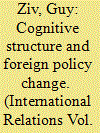| Srl | Item |
| 1 |
ID:
110845


|
|
|
|
|
| Publication |
2011.
|
| Summary/Abstract |
Rationalist explanations of foreign policy change are underdetermined because they overlook the decision-makers themselves. Insight from cognitive psychology shows that individuals' cognitive structures provide a useful lens through which to understand why some people are more likely than others to change their core beliefs. Two related cognitive variables - cognitive openness and cognitive complexity - hold promise for enhancing extant explanations of foreign policy change. This article assesses the cognitive structure of the three leaders who dominated Israeli decision-making in the decade leading up to Israel's dramatic policy change vis-à-vis the PLO in 1993: Yitzhak Shamir, Yitzhak Rabin and Shimon Peres. The article demonstrates that Peres, who is found to be the most cognitively open and complex, was quicker to embrace a dialogue with the PLO than Rabin, while Shamir, who is found to hold the lowest levels of openness and complexity, rejected this move altogether. Peres, and to a lesser extent Rabin, proved to be more sensitive to international, regional and domestic changes than Shamir. This case illustrates that systemic-structural and domestic political factors are necessary, but insufficient, conditions for foreign policy change. The levels of decision-makers' cognitive openness and complexity are key to determining the likelihood that they will change their beliefs on a core policy issue that can, in turn, lead to foreign policy change. This article thus contributes to our understanding of both foreign policy change and the process leading up to the historic 1993 agreement between Israel and the PLO.
|
|
|
|
|
|
|
|
|
|
|
|
|
|
|
|
| 2 |
ID:
172326


|
|
|
|
|
| Summary/Abstract |
Recent research into the public’s attitude toward the use of nuclear weapons repeats long-standing mistakes in how international relations theorists think about morality. Falsely equating consequentialism with state egoism and normative obligations with restrictions on the use of weapons of mass destruction implies that ethically motivated beliefs about foreign affairs must be other-regarding and that other-regarding behavior is not utilitarian in character. Drawing on empirical research into moral psychology, we argue that liberal, other-regarding morality is only one kind of ethical foundation. Alternative moral concerns such as retribution, deference to authority, and in-group loyalty also help to determine foreign policy beliefs. We find that all three are associated with support for the use of nuclear weapons in the American public. Our survey respondents act as moral utilitarians who weigh different ethical considerations in forming their judgments.
|
|
|
|
|
|
|
|
|
|
|
|
|
|
|
|